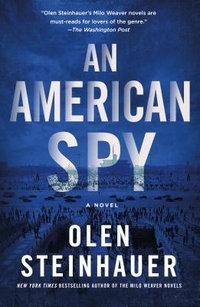The Nearest Exit by Olen Steinhauer
 Friday, January 17, 2020 at 11:37AM
Friday, January 17, 2020 at 11:37AM 
First published in 2010; reissued by Minotaur Books on February 4, 2020
The Nearest Exit is the second novel in Olen Steinhauer’s Milo Weaver trilogy. The trilogy was recently reissued because a fourth novel will soon be added to the series.
As we learned in The Tourist, Milo does nasty work for a branch of the CIA that few people know exist. Together with the Tourist Agents who research and support their missions, Tourists travel around the world imposing America’s will on foreign entities, usually by killing people the Tourist masterminds have come to dislike.
Milo didn’t seem to have or want much of a future as a Tourist by the time the first novel ended. He wanted to devote himself to his wife and daughter, not to the whims of his agency. When the new boss wants Milo to return, Milo finds he has little choice. Milo begins with some baby assignments but is eventually charged with killing a 15-year-old girl named Adriana Stanescu. Milo wonders if he is being asked to kill a child to prove his loyalty, but having a daughter of his own, he finds a way to circumvent the mission without jeopardizing his career. To achieve that goal, he enlists the help of his father, who is running a little spy operation of his own for the UN, unbeknownst to pretty much everyone except Milo.
Adriana’s eventual fate pits Milo against his boss, his father, and a highly placed German law enforcement agent named Erika Schwartz. Erika is morbidly obese and a serious alcoholic, although she reserves her heaviest drinking for the end of the workday. She’s also astonishingly good at her job, making her the most intriguing supporting character in the book.
Erika has a video of Milo kidnapping Adriana, which turns her into one of Milo’s many adversaries. Adriana’s father is another. But the most formidable of the group is a Chinese spymaster who may or may not have planted a mole among the Tourists — or perhaps among the few Senate aides who are cleared to know about the Tourist program.
The plot combines traditional themes of betrayal with a clever Chinese scheme that has Milo more than once changing his mind about the existence of a mole. By the time the action winds down, things are not looking good for the Tourists. Milo’s future seems particularly bleak, as does his marriage, which has not benefitted from his employer-imposed secretiveness or from his absences from the family as he charges off to make the world safer. Even the CIA-approved marriage counselor has some doubts about Milo’s ability to focus on his family.
Unlike the first novel, the story ends on something of a cliffhanger. That’s not unexpected in a trilogy and, having read the first two, I can’t imagine that any spy fiction fan would forego the pleasure of reading the third installment. The combination of strong plotting, international intrigue, and sharp characterizations enshrine Steinhauer in the top echelon of American spy novelists.
RECOMMENDED
 TChris |
TChris |  Post a Comment |
Post a Comment |  Olen Steinhauer,
Olen Steinhauer,  spy in
spy in  Thriller
Thriller 


